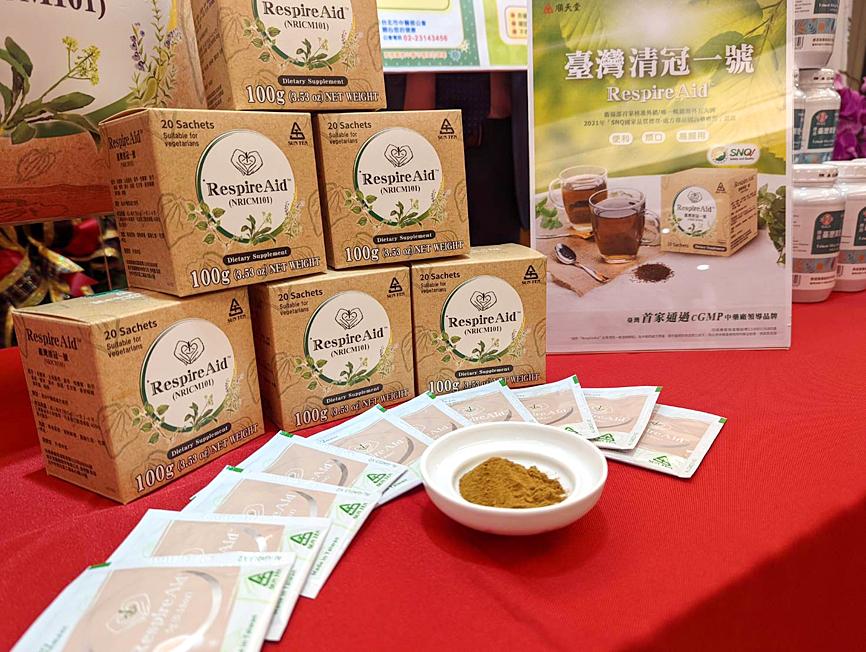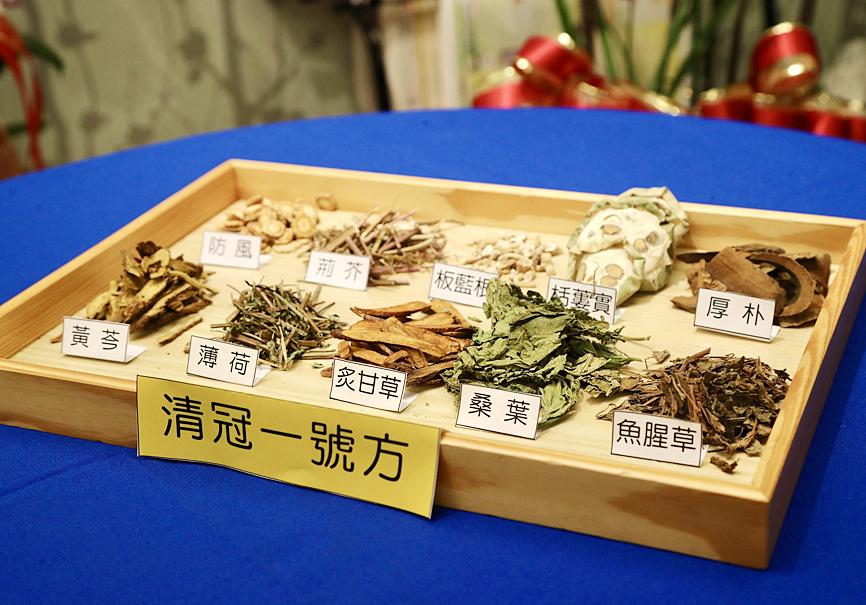A traditional herbal formula developed in Taiwan, known as Taiwan Chingguan Yihau (清冠一號), or NRICM101, is an effective treatment against COVID-19, traditional Chinese medicine (TCM) doctors said on Friday.
Huang Yi-chia (黃怡嘉), a TCM practitioner from Tri-Service General Hospital, said that her hospital has prescribed NRICM101 to more than 200 COVID-19 patients since it obtained emergency use authorization in Taiwan in May 2020.
The patients, aged three to 100, showed significant improvement after 10 days of treatment, she told a news conference.

Photo: Wu Liang-yi , Taipei Times
The medicine has also helped hundreds of thousands of COVID-19 patients abroad with no side effects reported, she said, without providing details.
The formula is being sold as a supplement overseas.
The National Union of Chinese Medical Doctors’ Association said that people with COVID-19 who are in home quarantine can obtain NRICM101 for free online.

Photo: CNA
They need to first arrange a telemedicine appointment with a TCM doctor on the Eucare app, which is supported by the Ministry of Health and Welfare, or contact a local branch for assistance.
Once someone has received a prescription, they can have a designated contact pick up the medicine for them or have a community pharmacist deliver it to their home, the association said.
In other news, the Central Epidemic Command Center (CECC) has expanded a list of pre-existing conditions that qualifies people as being at “high risk” for COVID-19 with severe complications, and thus eligible to receive oral treatments such as molnupiravir and Paxlovid.
The list was expanded because Taiwan signed a deal to purchase 700,000 courses of Paxlovid from Pfizer, meaning that it would have a large enough supply of the antiviral drug on hand, Centers for Disease Control official Huang Yu- cheng (黃玉成) said on Saturday.
The nation had previously only been able to purchase about 20,000 courses, which was why the rules were stricter, Huang added.
The CECC said that the list includes those who are current or former smokers, as well as those with chronic liver disease, tuberculosis, dementia or mental illnesses such as schizophrenia.
Prior to the update, only those with chronic diseases such as diabetes or heart disease, those who were immunocompromised, and those aged 65 or older were considered at high risk for severe complications.
People with hypertension have been removed from the list, while the body mass index required to be considered high risk has been raised from 25 to 30, Huang said.
The changes to the list were made so that lifesaving drugs would be used on the people with COVID-19 who could really benefit from them, he added.

Taiwanese can file complaints with the Tourism Administration to report travel agencies if their activities caused termination of a person’s citizenship, Mainland Affairs Council Minister Chiu Chui-cheng (邱垂正) said yesterday, after a podcaster highlighted a case in which a person’s citizenship was canceled for receiving a single-use Chinese passport to enter Russia. The council is aware of incidents in which people who signed up through Chinese travel agencies for tours of Russia were told they could obtain Russian visas and fast-track border clearance, Chiu told reporters on the sidelines of an event in Taipei. However, the travel agencies actually applied

Japanese footwear brand Onitsuka Tiger today issued a public apology and said it has suspended an employee amid allegations that the staff member discriminated against a Vietnamese customer at its Taipei 101 store. Posting on the social media platform Threads yesterday, a user said that an employee at the store said that “those shoes are very expensive” when her friend, who is a migrant worker from Vietnam, asked for assistance. The employee then ignored her until she asked again, to which she replied: "We don't have a size 37." The post had amassed nearly 26,000 likes and 916 comments as of this

New measures aimed at making Taiwan more attractive to foreign professionals came into effect this month, the National Development Council said yesterday. Among the changes, international students at Taiwanese universities would be able to work in Taiwan without a work permit in the two years after they graduate, explainer materials provided by the council said. In addition, foreign nationals who graduated from one of the world’s top 200 universities within the past five years can also apply for a two-year open work permit. Previously, those graduates would have needed to apply for a work permit using point-based criteria or have a Taiwanese company

The Shilin District Prosecutors’ Office yesterday indicted two Taiwanese and issued a wanted notice for Pete Liu (劉作虎), founder of Shenzhen-based smartphone manufacturer OnePlus Technology Co (萬普拉斯科技), for allegedly contravening the Act Governing Relations Between the People of the Taiwan Area and the Mainland Area (臺灣地區與大陸地區人民關係條例) by poaching 70 engineers in Taiwan. Liu allegedly traveled to Taiwan at the end of 2014 and met with a Taiwanese man surnamed Lin (林) to discuss establishing a mobile software research and development (R&D) team in Taiwan, prosecutors said. Without approval from the government, Lin, following Liu’s instructions, recruited more than 70 software